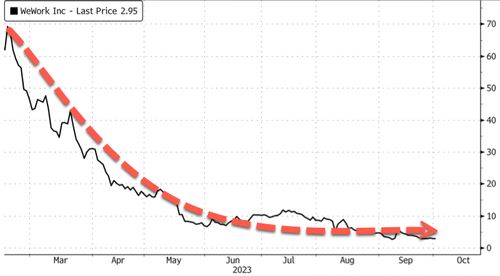 Parler
Parler Gab
Gab
- 15.000% First Lien Senior Secured PIK Notes due 2027;
- 11.000% Second Lien Senior Secured PIK Notes due 2027;
- 11.000% Second Lien Exchangeable Senior Secured PIK Notes due 2027;
- 12.000% Third Lien Senior Secured PIK Notes due 2027; and
- 12.000% Third Lien Exchangeable Senior Secured PIK Notes due 2027.
"I believe they will absolutely understand our decision to enter into the grace period," WeWork's interim chief executive, David Tolley, said in an interview. He called the move "typical" as a "precursor to a conversation.""Skipping an interest payment is not necessary to negotiate with lenders. But it is a move sometimes used by indebted companies to put pressure on lenders to restrike deals under more favorable terms," NYTimes noted. In early September, Tolley said the co-working start-up "will seek to negotiate terms with our landlords" and "part of these negotiations, we expect to exit unfit and underperforming locations and to reinvest in our strongest assets as we continuously improve our product." A month before that, WeWork shares crashed after the company stated in a filing:
...as a result of the Company's losses and projected cash needs, combined with increased member churn and current liquidity levels, substantial doubt exists about the Company's ability to continue as a going concern. The Company's ability to continue as a going concern is contingent upon successful execution of management's plan to improve liquidity and profitability over the next 12 months, which includes, without limitation:WeWork shares have been in freefall for most of the year.
- Reducing rent and tenancy costs via restructuring actions and negotiation of more favorable lease terms;
- Increasing revenue by reducing member churn and increasing new sales;
- Controlling expenses and limiting capital expenditures; and
- Seeking additional capital via issuance of debt or equity securities or asset sales.

Sam Bankman-Fried tried to recoup losses by opening fake accounts using IDs of Thai prostitutes
By Arsenio Toledo // Share
Oil prices surge following large-scale clashes between Israel and Palestine
By Arsenio Toledo // Share
U.S. mortgage rate surges to highest level in over two decades
By Richard Brown // Share
By Arsenio Toledo // Share
Russia and China dominate nuclear electricity generation industry ahead of the U.S.
By Laura Harris // Share
Governments continue to obscure COVID-19 vaccine data amid rising concerns over excess deaths
By patricklewis // Share
Tech giant Microsoft backs EXTINCTION with its support of carbon capture programs
By ramontomeydw // Share
Germany to resume arms exports to Israel despite repeated ceasefire violations
By isabelle // Share










